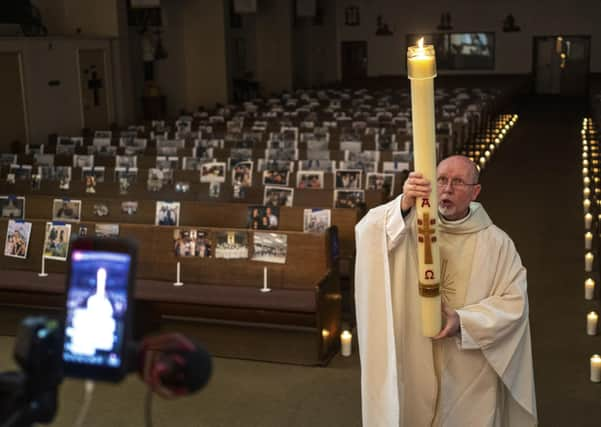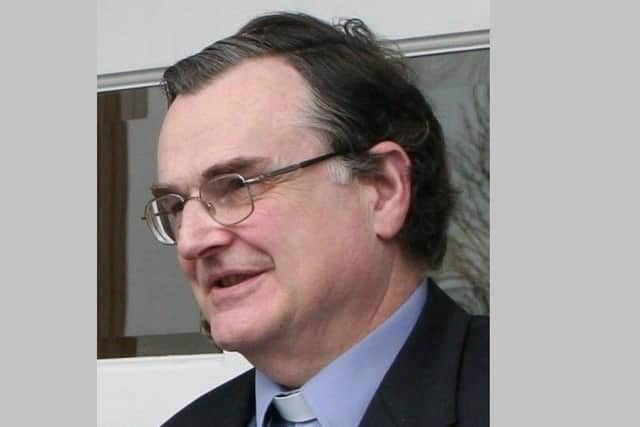Canon Ian Ellis: Churches have accepted restrictions but curbing the fundamental human right to worship should not be taken lightly


However, it will be important to recognise that, as has often been pointed out, it will be a case of a ‘new normal’.
Indeed, the University of Cambridge recently released the results of a study in which were set out no fewer than 275 possible ways of reducing the spread of the coronavirus after the current lockdown.
Advertisement
Hide AdAdvertisement
Hide AdProfessor William Sutherland, of the university’s Department of Zoology, who led the study, commented: “There’s increasing pressure to re-open the economy and get people back to work and out of isolation. But if we return to operating as we did before the pandemic, there will be a second wave of the virus.


“All activities will need to be considered individually, and phased back in carefully, depending on the risk they pose to spreading the virus.”
In a recent statement, senior Irish church leaders have asked the Stormont executive to consider easing the current general church restrictions so that, where the medical and scientific advice indicates that it would be possible, church buildings could be open “sooner rather than later” for individual visits and private prayer, where this is desired locally and can be done safely with appropriate social distancing arrangements.
In considering this request, as the church leaders have intimated, medical and scientific considerations will appropriately take priority.
Advertisement
Hide AdAdvertisement
Hide AdThe last thing anyone would want would be for churches to be places where the virus would spread, let alone be ‘super-spreaders’ of the disease.
Governments restricting churches is different from doing so to cinemas, theatres or restaurants, for example, because there is a specific and fundamental human right involved.
Other public places have a right to exist by law and the general public has a basic human right to freedom of movement and association.
Religion comes into a specific category. As a member state of the European Union until the end of last year, the UK was necessarily part of the European Convention on Human Rights (ECHR). However, last month the EU’s chief negotiator with the UK on establishing post-Brexit trade arrangements, Michel Barnier, said that the UK did not wish to commit formally to continuing to apply the ECHR.
Advertisement
Hide AdAdvertisement
Hide AdWhatever the future holds on that score, freedom of religion or belief is enshrined not only in the ECHR but also in the Universal Declaration of Human Rights (1948) and the UK’s own Human Rights Act (1998).
Echoing Article 18 of the 1948 Declaration and Article 9 of the ECHR, the 1998 Act’s Article 9.1 states that everyone has “the right to freedom of thought, conscience and religion”.
It is indicated that this right includes the freedom “either alone or in community with others and in public or private” to manifest one’s religion or belief “in worship, teaching, practice and observance”.
The same act’s Article 9.2 states that this freedom “shall be subject only to such limitations as are prescribed by law and are necessary in a democratic society in the interests of public safety, for the protection of public order, health or morals, or for the protection of the rights and freedoms of others”.
Advertisement
Hide AdAdvertisement
Hide AdIt is important to recognise that the current restrictions on places of worship, while certainly within the legal provisions, is not a matter about which one may be in any way indifferent.
The Conference of European Churches (CEC), of which the Church of Ireland and the Methodist and Presbyterian churches are full members, has considered the whole issue of freedom of religion or belief during the fight against the Covid-19 pandemic.
Also recognising the appropriateness of states closing places of worship in the current circumstances, a special CEC group points out: “Whilst in times of persecutions, massacres and genocides, and even previous pandemics, churches have been places of refuge and consolation for many believers, it is important to acknowledge that the prohibition of assemblies, including services, are not meant as religious discrimination and persecution. At present this measure is intended to safeguard human lives, both of the believers and of other members of society.”
However, the church group goes on to indicate that “all restrictions of fundamental rights must have a legal base, be necessary, suitable, reasonable and generally proportionate in relation to the aim they serve and the right they limit. The principle of equal treatment, including the consistency of measures, must also be considered”.
Advertisement
Hide AdAdvertisement
Hide AdThe group maintains that the current, imminent and dangerous coronavirus threat “does not generally discharge the executive, or even the legislative branch of government from these requirements”.
At the same time the group also maintains that, despite some of the emergency measures posing questions as to “whether they are adequate and in proportion, and guarantee equal treatment to the different social actors”, believers should show “patience and goodwill” while continuing to follow the official regulations and offer assistance where they are causing special hardship.
It is no light thing for any government to restrict places of worship but the seriousness of the situation is to match the seriousness of that ruling.
• Canon Ian Ellis is a former editor of The Church of Ireland Gazette